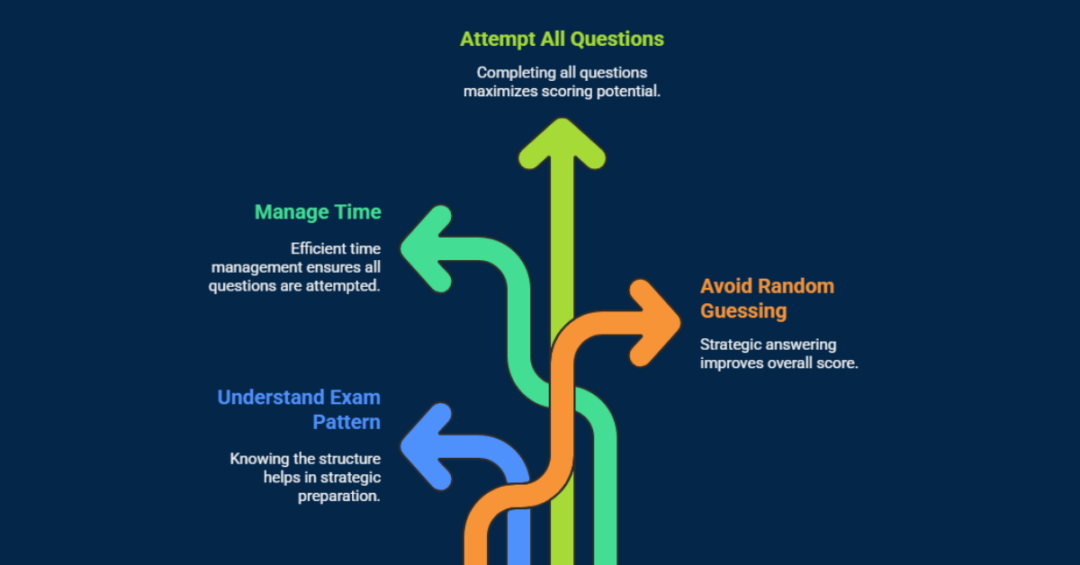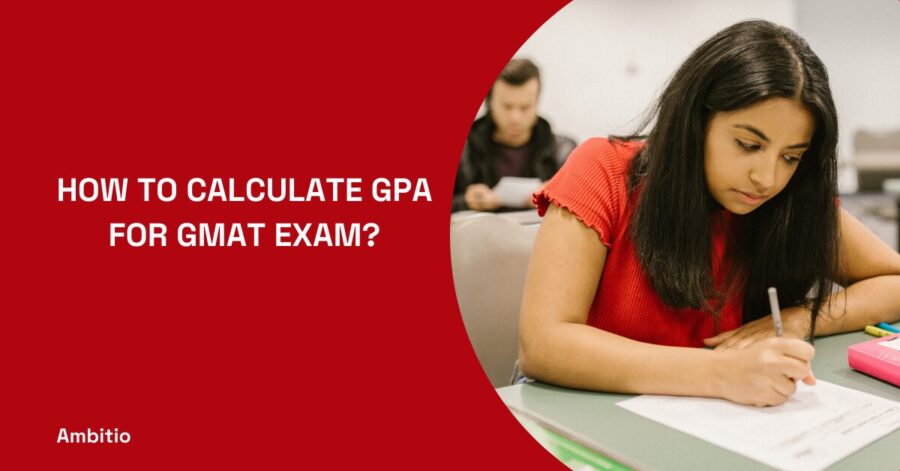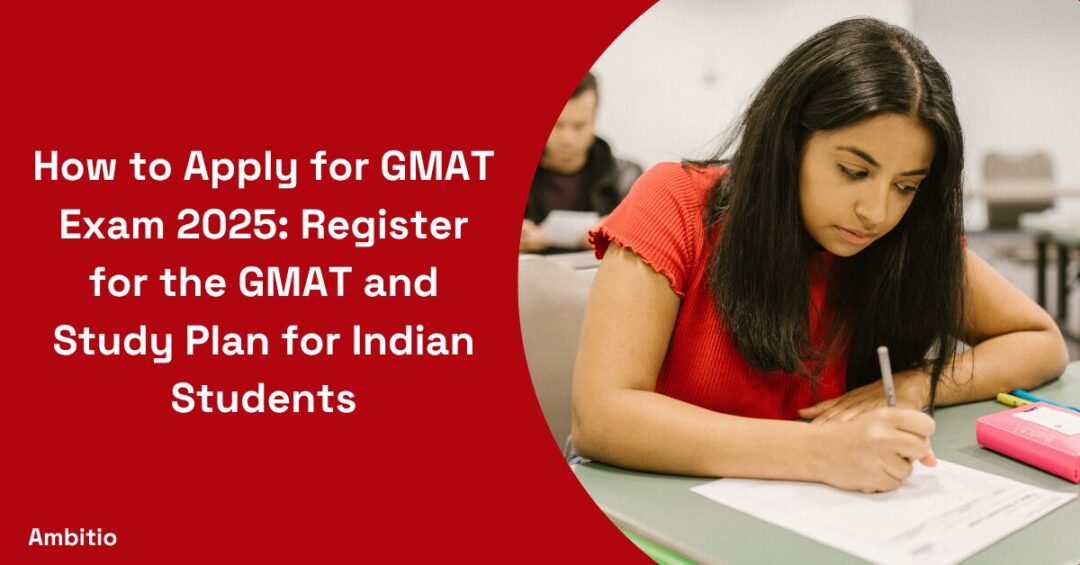6 August 2025
6 minutes read
Does GMAT Have Negative Marking? What Is GMAT Exam Pattern 2025?

Key Takeaways
- Does GMAT have negative marking? No—but incorrect answers can lower your score by triggering easier questions in this adaptive test.
- The new GMAT Focus Edition includes 64 questions across 3 sections, to be completed in just 2 hours and 15 minutes.
- Focus on understanding the exam pattern and attempt all questions to maximize your score potential.
Over 100,000 aspirants take the GMAT exam every year and one of the most asked questions is: “Does GMAT have negative marking?” With the latest GMAT Focus Edition in 2025, the exam now consists of just three sections, 64 questions, and a total duration of 2 hours and 15 minutes. It’s computer-adaptive, meaning every question is tailored to your performance. But with the pressure to attempt every question within the time limit, many worry about the impact of incorrect answers on their GMAT score.
Here’s the truth: Most students don’t fear the difficulty level, they fear the unknown. You’ve probably asked yourself if an incorrect answer in the quantitative reasoning or verbal reasoning section will drag your overall score down. And while trying to “figure out” the GMAT exam pattern 2025, you’re stuck between prep advice, GMAT format myths, and confusing scoring rules. Let’s break it down with clarity, so you can prep smart, answer every question confidently, and understand the exam not just fear it.
What Is The GMAT Exam Pattern and Scoring System?
The new GMAT Focus Edition in 2025 has simplified the exam format while still challenging your reasoning and decision-making skills. The exam consists of three sections: Quantitative Reasoning, Verbal Reasoning, and the new Data Insights section with a total of 64 questions. The GMAT is a computer-adaptive test, which means each next question adapts based on your performance, not just your last answer. So, it’s essential to understand the GMAT exam pattern to plan your GMAT prep smartly.

One of the most common concerns among test-takers is: “Does GMAT have negative marking?” The answer is NO. There is no negative marking in the GMAT. But because the difficulty level of the questions affects your GMAT Focus Edition score, skipping questions or guessing randomly can still impact your overall GMAT score. To score well, you must attempt all questions, manage time across sections of the exam, and fully understand the marking in the GMAT exam date.
| Section of the GMAT | Number of Questions | Question Types | Key Details |
|---|---|---|---|
| Quantitative Reasoning | 21 | Problem Solving Question, Data Sufficiency Questions | Tests your logic and math concepts. No calculator allowed. Part of the quantitative reasoning score. |
| Verbal Reasoning | 23 | Reading Comprehension, Critical Reasoning | Assesses your ability to understand written material and evaluate arguments. Based on GMAT exam pattern for verbal. |
| Data Insights | 20 | Multi-source reasoning, table analysis, graphic interpretation, two-part analysis | Replaces Integrated Reasoning. Requires analyzing and synthesizing data. Reflects the exam pattern for data insights. |
| Total Questions | 64 | Two types of questions (objective and logic-based) | You must answer every question correctly or strategically to improve the overall GMAT score. |
| Test Duration | 2 hours 15 minutes | – | Includes one optional 10-minute break. You must complete the questions within the time limit. |
| Scoring & Format | Scored on a scale of 205–805 | Computer-adaptive test, section-wise scoring | The GMAT exam is computer-adaptive, adjusting question difficulty based on performance. No analytical writing assessment in this version of GMAT. |
Does GMAT Have Negative Marking for Wrong Answers?
One of the biggest concerns during GMAT preparation is the fear of penalties for wrong answers. The truth is—GMAT does not have negative marking. But that doesn’t mean answering incorrectly has no consequences. Since the GMAT is computer-adaptive, the score you get depends heavily on how difficult the GMAT question papers are and how consistently you answer them correctly.
What Happens If You Answer Incorrectly?
When you answer a GMAT question wrong, there’s no direct penalty in terms of marks being cut. However, the GMAT exam format adjusts the difficulty level of the next question based on your previous response. So, while there’s no negative marking in the GMAT, an incorrect answer may lead to an easier question, which can lower your overall GMAT score when it’s converted into a scaled score.
In the quantitative reasoning section or verbal section, getting more challenging questions means you’re performing well. The reasoning score is calculated based on how hard the questions you attempt are—so incorrect answers could affect how the test evaluates your ability, even without a “minus marking” approach.
Penalties for Skipping Questions or Leaving Them Unanswered
Skipping questions can be risky. In the new format, the GMAT Test Series includes 64 questions spread across three sections, and completing the exam within the 2-hour duration is crucial. If you leave questions unanswered in any section in the GMAT, especially in the GMAT Focus Edition, it can hurt your official score report. There’s no partial credit, and skipping could reduce your chances of reaching a strong scaled score.
The GMAT exam pattern for quantitative, verbal, and data insights is designed to assess not just accuracy but also consistency and time management. So, while the GMAT exam is scored without traditional penalties, skipping too many questions can result in a significantly lower score.
Myths About Negative Marking in GMAT
Many believe that incorrect answers on the GMAT are treated like they are in traditional entrance exams—with marks being deducted. That’s false. The GMAT is computer-adaptive, and its penalty is indirect: it evaluates how well you handle increasingly difficult questions. The better your accuracy, the higher the difficulty level, and the better your chances of scoring high in the quantitative and verbal sections.
Another common myth is that the GMAT penalizes random guessing harshly. While guessing too often can affect your adaptive progression, it’s still better than leaving questions blank. A solid understanding of the GMAT syllabus, GMAT pattern, and GMAT number of questions—including subjective and objective questions—will help you guess more strategically, especially under pressure.
5 Tips to Improve Your GMAT Score
Scoring well on the GMAT Focus Edition exam requires more than just knowledge—it demands strategy. With the new GMAT exam pattern, the test is tighter, smarter, and more skills-focused. It consists of 64 questions across three sections, and the exam is 2 hours long, so time management, familiarity with the format, and smart guessing matter just as much as preparation.
Whether you’re taking the online GMAT or appearing at a test center, improving your score begins with understanding the exam pattern. Each section in the GMAT includes a mix of subjective and objective questions, and every minute counts. Here’s how to improve your performance, section by section:
- Understand the GMAT New Format Thoroughly
Familiarize yourself with the new GMAT exam pattern, especially the adaptive structure and section-wise scoring. The GMAT gives you fewer questions but expects deeper reasoning—quality over quantity. - Master the Exam Pattern for Quantitative Reasoning
The exam pattern for quantitative reasoning focuses on logic and problem-solving rather than pure math. Focus on core concepts and practice applying them quickly under timed conditions. - Strengthen Your Verbal Reasoning Skills
According to the exam pattern for GMAT verbal reasoning, you’ll deal with reading comprehension and critical reasoning. Practice identifying assumptions, strengthening arguments, and reading complex passages quickly. - Practice Data Insights Intensively
The GMAT exam pattern for data includes multi-source reasoning, table analysis, and interpreting data visuals. Build your ability by joining the GMAT Course to sift through data and extract relevant insights under time pressure. - Time Yourself with Real GMAT-Like Practice Tests
Because the exam is 2 hours, simulating real test conditions is critical. Take full-length mocks that follow the GMAT new structure and review each section based on timing, accuracy, and question type.
Conclusion
To wrap it up—does GMAT have negative marking? No, it doesn’t. However, every response matters since the questions in the GMAT adapt to your performance. While there’s no direct penalty for wrong answers, accuracy still impacts your final score. Understanding the syllabus given and practicing under timed conditions can help you make the most of every question.
Want to boost your GMAT prep with expert guidance? Ambitio offers personalized study plans and expert mentoring to help you crack the GMAT with confidence. Start your journey with Ambitio today because smart prep leads to dream admits.
FAQs
Does the GMAT exam have negative markings?
No, the GMAT exam does not have negative marks for incorrect answers.
What are the main sections of the GMAT exam?
The GMAT consists of Analytical Writing, Integrated Reasoning, Quantitative Reasoning, and Verbal Reasoning sections.
How is the GMAT score calculated?
The GMAT score is calculated based on the number of correct answers, the difficulty level of the questions, and other factors, without negative marking for incorrect responses.
Is the GMAT a computer-adaptive test?
Yes, the GMAT is a computer-adaptive test, where the difficulty of questions changes based on the test-taker’s performance.
How important is time management in the GMAT exam?
Time management is crucial in the GMAT, as test-takers must balance speed with accuracy to answer all questions within the allotted time.
How long is the GMAT exam?
The exam lasts about 3 hours and 7 minutes, including breaks.
Can I change my answers during the exam?
You can change answers before submitting, but time management is crucial.

You can study at top universities worldwide!
Get expert tips and tricks to get into top universities with a free expert session.
Book Your Free 30-Minute Session Now! Book a call now




























